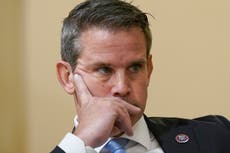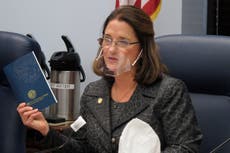College degree is now ‘a matter of life and death,’ say Nobel Prize winners
Princeton University professor says it is an ‘outrage’ for non-educated Americans to die younger
Two Nobel prize winners have argued that having a college degree is now a decider of “life and death” for many Americans, as the mortality rate among non-Hispanic whites worsens.
Angus Deaton and his wife, Anne Case, who are both professors for Princeton University and were awarded the Nobel Memorial Prize in Economic Sciences in 2015, argue that a degree is now the deciding factor for mortality.
Speaking with MarketWatch, Mr Deaton said the duo found through research at Princeton University that a form of higher education was a bigger signifier for a long life than being Black, white or Hispanic.
In fact, Mr Deaton found that the mortality gap between Black and non-Hispanic whites was not only eroding slowly, but was smaller than the gap between those with or without a college degree.
His research, an early draft of which was published this month, said that “By 2019, the gap in life expectancy at age 25 between those with and without a BA (bachelor of arts) had risen to a high of 6.3 years”.
As the Centres for Disease Control and Prevention (CDC) found in 2018, the gap in life expectancy between non-Hispanic white and Black Americans at age 25 was 2.9 years — almost half that for having or not having a four year college education.
That was 79.5 for non-Hispanic whites, 82.7 for Hispanics, and 76.4 for Black Americans.
Mr Deaton said the wage for Americans without a college degree was one of the reasons why life expectancy was lowering for those without a form of higher education.
“We already talked about the fact that death rates are going up for people without a BA and going down for people with a BA,” said the Nobel prize winner. “That sounds like a matter of life and death to me”.
“And again, the troublesome thing is not so much the people at the top are doing really well, but the median wage for men without a BA has fallen for 50 years.”
A 2017 report from the US department of education found that the difference between a college education and not having one was roughly $18,000 ($13,000) a year, in terms of a median wage.
Mr Deaton, highlighting that roughly two thirds of Americans are not college educated, reportedly warns in the report that the current economic model was “not delivering for the majority of Americans.”
“It’s an outrage,” he said in the interview with MarketWatch. “It’s not just like there’s a few people who didn’t do very well. It’s the two-thirds of the population that don’t have a college degree and it’s unnecessary”.
“The BA has become a condition for dignified work and self-esteem. That’s terrible; that’s not what a BA is for,” he added.
Mr Deaton’s remarks come a week after Democrats failed to unite behind a trillion-dollar figure for Joe Biden’s social spending proposals, which are also known as his “Build Back Better” agenda.
The finalised spending bill will likely do without many of the healthcare provisions and funding for reducing poverty, as centrist Democrats and Republicans have turned down spending $3.5 trillion on the bill.
Join our commenting forum
Join thought-provoking conversations, follow other Independent readers and see their replies
Comments




Bookmark popover
Removed from bookmarks